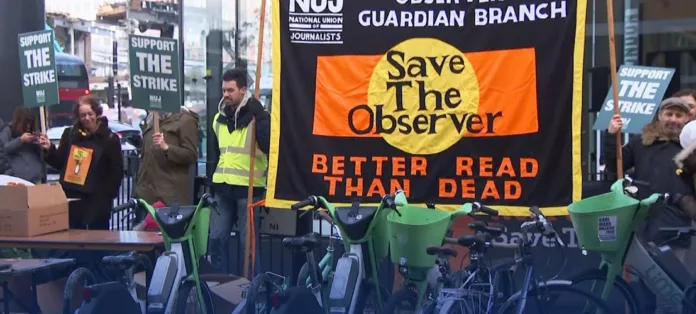Journalists at the Guardian and observer launch a two-day strike to protest the proposed sale of the Sunday paper to Tortoise Media
Journalists at the Guardian and its sister publication, the Observer, have embarked on a two-day strike, marking the first industrial action at the Guardian in over 50 years. The strike, which took place on December 4 and 5, is a protest against the proposed sale of the Observer newspaper to Tortoise Media. Staff argue that the deal threatens the long-standing commitment to editorial independence upheld by the Scott Trust, which owns the Guardian Media Group (GMG).
The proposed sale would see Tortoise Media, led by former Times editor James Harding, invest £25 million over the next five years to support the editorial and commercial renewal of the Observer. However, many Guardian and Observer journalists believe that the move compromises the newspaper’s identity, rooted in liberal and independent journalism. For them, the sale represents a breach of the Scott Trust’s mission to preserve the integrity of both titles, and they argue that such a shift would undermine their journalistic work.
The industrial action comes after the National Union of Journalists (NUJ) passed a motion condemning the sale. Union members have described the potential sale of the Observer as a “betrayal” of the trust’s commitment to the world’s oldest Sunday newspaper. The NUJ claims that Tortoise’s acquisition would put the future of the Observer at risk and threaten the independence of its editorial stance.
Guardian Media Group responded to the strike by acknowledging the concerns raised by the journalists. A spokesperson said the company recognised the strength of feeling on the matter but did not believe that striking was the most appropriate course of action. The company has assured readers that it would continue publishing both its online content and print editions during the strike, although some differences may be noticeable.
Tortoise Media’s proposed takeover plan includes offering Observer staff the choice to take voluntary redundancy with enhanced terms or transfer to Tortoise Media with the same contractual conditions. Anna Bateson, the managing director of GMG, stated that the company would continue to have “constructive talks” with staff to ensure their protection should the sale proceed. Bateson also confirmed that freelance contracts would be extended until September 2025, after which renegotiations would take place.
The strike has been framed as a pivotal moment in the ongoing debate over the future of British journalism. NUJ general secretary-elect Laura Davison voiced strong support for the journalists taking industrial action, highlighting the significance of the move and the broad concerns of the staff. She noted the high level of support within the union for the strike and emphasised the deep attachment the journalists have to the Observer, a publication with a proud 233-year history. For many, the Observer represents more than just a paper – it is a vital part of Britain’s media landscape.
The controversy surrounding the sale is further complicated by the role of the Scott Trust, which has insisted that it would remain part-owner of the Observer even if the sale to Tortoise Media goes ahead. The trust has stated that the new owners would have to meet strict criteria, including upholding the values of editorial independence, press freedom, and liberal journalism. Ole Jacob Sunde, chair of the Scott Trust, reiterated the trust’s commitment to these principles, assuring staff that the deal would be carefully scrutinised to protect the integrity of both the Guardian and the Observer.
However, many journalists feel that the Scott Trust’s assurances are insufficient. The proposed sale has stirred fears about the potential influence of a media company with commercial interests and how that might affect the paper’s editorial direction. Journalists at the Guardian and Observer are concerned that the sale would lead to a loss of the independence that has characterised both publications for decades.
James Harding, who co-founded Tortoise Media after leaving the Times, has defended the deal, arguing that it would provide much-needed investment to ensure the Observer’s future. He has suggested that the deal would not compromise the paper’s editorial integrity but would instead offer the opportunity to reinvigorate the publication, giving it the resources necessary to continue its work. Harding’s statements have done little to quell the concerns of the staff, who remain sceptical about Tortoise’s involvement in the paper’s future.
The strike has drawn significant attention from the wider media community, with many expressing support for the journalists involved. Several media figures have voiced their concerns about the implications of the sale for the wider British media landscape, noting that it raises broader questions about the state of press independence in the country. For now, the future of the Observer hangs in the balance, as talks continue and both sides seek to find common ground.
